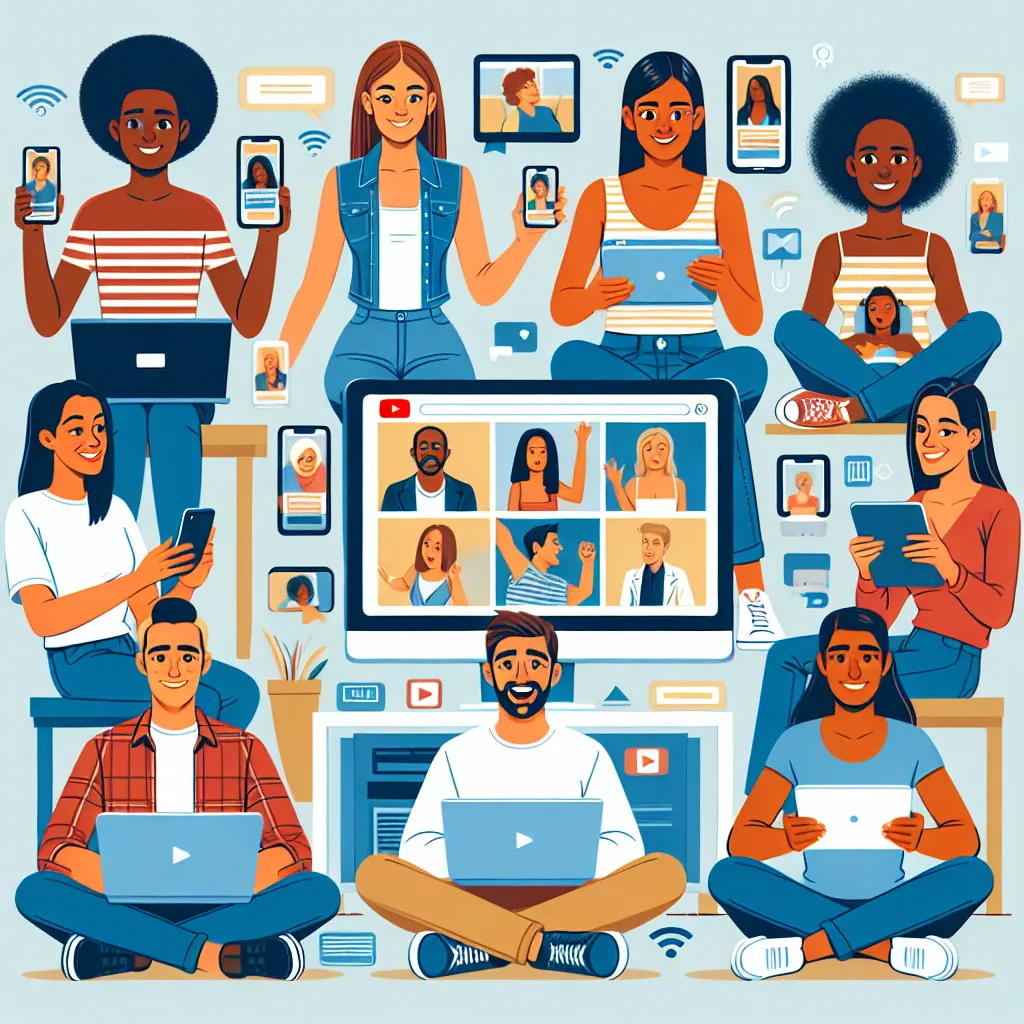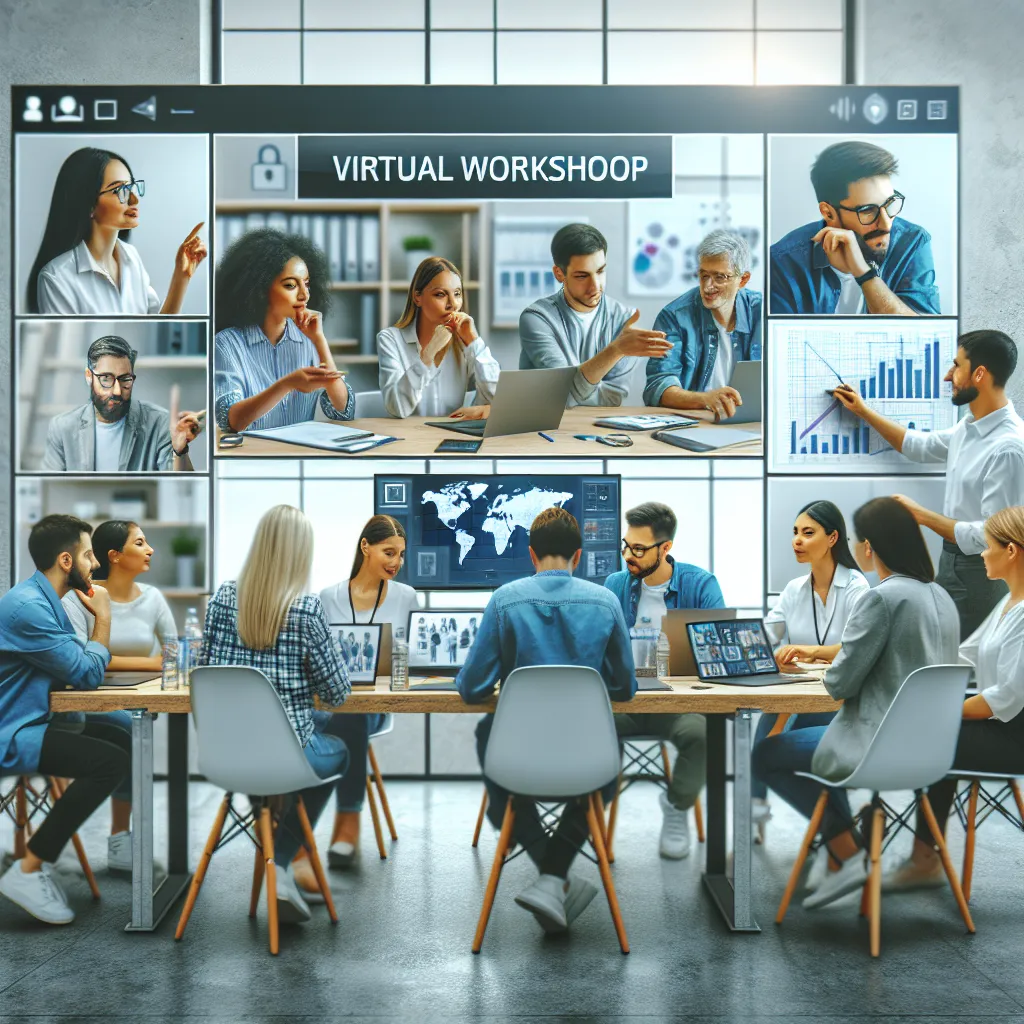The article “Understanding the Virtual Audience: Key Insights for Conference Success” emphasizes the importance of adapting conference strategies to accommodate the unique needs of online attendees. It highlights the significance of recognizing the shorter attention span of virtual audiences, emphasizing the inclusion of dynamic sessions, frequent breaks, and interactive elements to maintain engagement. Additionally, the article stresses the importance of tailoring content to diverse virtual audience demographics, leveraging data analytics, and audience feedback to inform decisions and enhance the conference experience. The subsequent piece, “Harnessing Technology: Enhancing Participant Engagement in Virtual Conferences,” underscores the crucial role of technology in creating immersive virtual conference experiences. It discusses the utilization of virtual event platforms, advanced video streaming technology, social media integration, and gamification techniques to enhance participant engagement and foster community. By encapsulating key insights from both articles, readers are encouraged to gain a comprehensive understanding of virtual audience dynamics and effective technological strategies for maximizing engagement in virtual conferences.
The future of gatherings is evolving with the rise of hybrid events, blending in-person and virtual experiences to cater to diverse attendee preferences and extend the reach of events. This trend offers increased participation, engagement, and a more sustainable approach to events by reducing the carbon footprint associated with travel. Additionally, sustainability has emerged as a pivotal trend in event planning, with a growing emphasis on minimizing environmental impacts and social responsibility, from venue selection to waste management and community engagement. Moreover, the post-pandemic era has seen a significant shift towards virtual reality experiences in events, creating immersive and engaging platforms. With the integration of sustainability, hybrid events, and virtual reality experiences, the events industry is embracing versatile solutions to meet the evolving needs of event organizers and participants, shaping the future of gatherings.
In the era of virtual events and online conferences, it is crucial to maximize engagement and ensure a fulfilling experience for participants. Key strategies for achieving this include incorporating interactive elements into the conference agenda, leveraging technology for engagement, and personalizing content to specific interests and needs. Interactive tools such as live polling, breakout rooms, and interactive Q&A sessions play a significant role in fostering collaboration, networking, and active participation. Additionally, integrating gamification elements adds a fun and competitive aspect, further enhancing engagement. By implementing these strategies and tools, conference organizers can create a more dynamic, participatory, and enriching experience for all participants, ultimately leading to a successful online conference.
The article explores the significant impact of live streaming on audience interaction, emphasizing the real-time engagement and personal connection it fosters. By enabling viewers to actively participate through comments, questions, and polls, live streaming creates a sense of belonging and community, leading to heightened audience retention and loyalty. Additionally, the article highlights the immediate feedback and adaptability that live streaming offers, as well as its potential for multi-platform engagement to reach diverse audiences. Furthermore, it underscores the advantages of the real-time, unfiltered experience that live streams provide, leading to increased trust, loyalty, and valuable insights for content creators. Overall, the article effectively underscores the compelling benefits of live streaming in enhancing audience engagement, making it a must-read for individuals looking to optimize their content strategies.
The article “Maximizing Engagement: Strategies for Navigating Virtual Events” delves into the essential techniques for creating impactful virtual experiences. It emphasizes the significance of active participation and engagement in virtual conferences, webinars, and workshops and provides strategies to achieve this. The outlined approaches include incorporating interactive tools, delivering compelling content, facilitating networking opportunities, engaging presenters, and sustaining post-event engagement. By implementing these strategies, event organizers and hosts can effectively navigate virtual events, ultimately maximizing participant engagement and creating memorable experiences. The article also highlights the importance of effectively networking in a virtual environment, offering techniques such as leveraging social media platforms, participating in virtual events, engaging in video calls, and maintaining a strong online presence. It encourages readers to explore these strategies to enhance their virtual networking experiences and establish genuine connections.
The article explores the evolving landscape of online conferences, emphasizing the shift towards virtual platforms and the challenges and opportunities that come with it. It highlights the fundamental changes in networking, information sharing, and inclusivity brought about by virtual conferences, offering a more diverse and engaging experience for participants worldwide. The author emphasizes the importance of careful selection and optimization of virtual tools to ensure seamless connectivity, interactivity, and inclusivity. Furthermore, the article outlines the challenges of maintaining engagement in virtual conference settings and suggests innovative strategies such as live polls, gamification, and social media integration to overcome these hurdles. By embracing the potential of virtual technologies and prioritizing meaningful engagement, organizers can create enriching conference experiences that transcend geographical boundaries and cater to diverse participant needs. The article invites the reader to delve deeper into the comprehensive discussion on the evolution and adaptation of online conferences to fully grasp the dynamic opportunities and navigate the challenges posed by the virtual landscape.
The article explores the transformative shift in the education landscape towards online learning, emphasizing the flexibility and accessibility it offers for individuals to upskill and pursue lifelong learning. It highlights the empowering evolution of virtual workshops, breaking down barriers to education and providing personalized, interactive, and collaborative learning experiences. The article also stresses the importance of adapting to change and navigating the future of learning through the dynamic platform of online workshops, which facilitate personalized learning experiences and incorporate interactive elements to enhance the adaptability of the learning process. Overall, it encourages readers to embrace the potential of online workshops for inclusive, engaging, and impactful learning experiences in the rapidly evolving future of education.
In the current digital age, businesses are undergoing a significant transformation as they embrace digital technologies and adapt to the online realm, revolutionizing their experiences to meet the ever-changing needs and demands of consumers. This shift involves leveraging digital platforms for marketing and sales, gathering valuable insights through analytics, and integrating seamless online experiences to provide a consistent and personalized touch for their customers. The evolution of customer experiences in the digital age has led to a paradigm shift in how businesses engage with their customers, emphasizing hyper-customization, rethinking the customer journey, and prioritizing transparency and authenticity in online interactions. As businesses adapt to the online realm, embracing digital transformation is essential for driving growth, enhancing customer relationships, and staying competitive in today’s fast-paced digital landscape. The article offers an in-depth exploration of how businesses are navigating this transformation, making it a compelling read for those seeking insights into thriving in the evolving digital economy.
The article delves into the legal implications of live streaming for content creators, highlighting the need for a clear understanding of copyright laws, privacy regulations, defamation risks, and advertising guidelines. It emphasizes the importance of obtaining necessary rights for the content being streamed, being mindful of privacy rights, avoiding defamation or libel claims, and disclosing any sponsored relationships. Additionally, it underscores the ethical challenges posed by live streaming, particularly concerning privacy and consent, exploitation of vulnerable individuals, and transparency in monetization. With its comprehensive coverage of legal and ethical considerations, the article provides valuable insights for content creators and readers.
The article explores the rise of hybrid events, which combine virtual and in-person experiences to cater to diverse consumer preferences, break down geographical barriers, and engage both local and global audiences. By integrating virtual elements into traditional events, organizers provide interactive online components, extend engagement, and gather valuable insights through data and analytics. The article also highlights personalization as a game-changer in creating impactful events, and emphasizes sustainability in event planning, addressing the growing demand for environmentally responsible practices. The comprehensive insight into these evolving event trends invites readers to explore how the industry is innovating and redefining the possibilities for creating meaningful and impactful experiences.
The rise of virtual networking has transformed the way individuals and businesses connect and collaborate, with digital meetups, virtual conferences, and online networking events becoming powerful platforms for forging new professional relationships and fostering innovation. The impact of digital meetups on networking and collaboration is evident in their ability to connect individuals with a diverse range of professionals from across the globe, fostering cross-pollination of ideas and dynamic collaborations. Moreover, digital meetups have proven to be cost-effective and efficient, eliminating the need for extensive travel and accommodation expenses associated with physical events, while also offering various technological tools and features that enhance the networking experience. Leveraging digital platforms for enhanced collaboration and connections has become a game-changer for professionals across industries, transcending traditional barriers of time and space and empowering professionals to break free from the limitations of traditional networking. This paradigm shift in networking offers an expansive, cost-effective, and tech-savvy approach to building valuable professional relationships and driving innovation in the digital age.
The article “The Rise of Interactive Live Streaming Experiences” explores the transformative impact of interactive live streaming on audience engagement, driven by the growing demand for personalized and immersive content. It highlights the integration of advanced technology, such as augmented reality (AR) and virtual reality (VR), to create dynamic and participatory experiences for viewers, ultimately reshaping the live streaming landscape. Moreover, the article emphasizes the opportunities for content creators and brands to deepen audience connections, drive engagement, and gather real-time feedback through interactive live streaming. As the future of live streaming continues to evolve, the article suggests that these immersive and interactive experiences are redefining the way audiences connect, consume, and interact with live content, making it a must-read for anyone interested in the evolving landscape of live streaming.
The article discusses the rise of digital meetups in the networking landscape, highlighting how they have revolutionized the traditional methods of networking and collaboration. It emphasizes the convenience and accessibility of digital meetups, which allow for a diverse and global audience to engage in real-time discussions regardless of geographical constraints. The article also underscores the interactive nature of digital meetups, fostering meaningful connections and strengthening professional relationships through dynamic discussions. Furthermore, it delves into the influence of digital meetups on fostering collaboration in business interactions, emphasizing the accessibility, dynamic environment, and impact on knowledge sharing and skills development. Overall, the article provides compelling insights into the transformative impact of digital meetups, making a strong case for professionals to explore the subject further.
The article “The Benefits of Online Workshops for Working Professionals” highlights the transformative impact of online workshops on the professional development landscape. It emphasizes the flexibility of online workshops, enabling professionals to access valuable content at their convenience without compromising their work schedules. Additionally, the article underlines the diverse learning opportunities and networking benefits that online workshops offer, emphasizing how these platforms cater to the specific needs and interests of professionals. Furthermore, it stresses the engaging and immersive nature of online workshops, incorporating interactive technologies and multimedia resources to enhance the learning experience. Overall, the article encourages readers to explore the numerous advantages of online workshops in fostering continuous learning and staying competitive in the digital age.
The article “The Evolution of Streaming Platforms: Changing the Entertainment Landscape” highlights the monumental shift in the entertainment industry with the rise of online shows and the pivotal role played by streaming platforms in transforming the way audiences consume content. It discusses how platforms like Netflix, Amazon Prime, Hulu, and Disney+ have revolutionized the concept of entertainment by offering a wide array of content, impacting both established creators and emerging talent. Furthermore, the article emphasizes the paradigm shift in content creation, distribution, and consumption, underscoring the unprecedented opportunities for both creators and audiences in this new era of entertainment. The impact of online shows on traditional television is also explored, showcasing the significant influence of online streaming platforms on viewing habits and preferences. The power of online shows in redefining entertainment is further highlighted, focusing on their accessibility and role in reshaping content creation and distribution, ultimately shaping the entertainment landscape. Read the full article to delve deeper into the transformative influence of streaming platforms and online shows on the industry.
The article delves into strategies for enhancing engagement in virtual workshops, a critical concern for organizations delivering remote training. It emphasizes the need for interactive elements, multimedia content, clear goals, and collaborative tools to foster participant engagement. Furthermore, it details the importance of skilled facilitation, immediate feedback, and the creation of a sense of community to enhance learning outcomes in online training sessions. Overall, the article argues for a thoughtful combination of interactive elements, multimedia resources, and skilled facilitation to create engaging and effective virtual workshop environments.
In today’s rapidly evolving business landscape, virtual networking plays a pivotal role in ensuring efficiency, productivity, and competitiveness. The seamless connectivity it offers facilitates real-time collaboration and information sharing among geographically dispersed teams, particularly valuable in the increasingly prevalent remote work environment. Moreover, optimizing virtual networking enhances security and reliability, addressing concerns over data privacy and cyber threats. Strategic utilization of virtual networking lays the foundation for future-proofing business operations, empowering organizations to capitalize on emerging opportunities and innovations. Strategies for maximizing virtual networking’s potential, including robust security measures, advanced networking technologies, and proactive performance monitoring, are crucial for driving success and efficiency in operations. Embracing the significance of virtual networking and its enhancement fortifies digital infrastructure, fosters collaborative ecosystems, and propels competitiveness amidst evolving market demands.

















